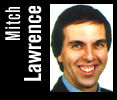 |

|
Updated: July 5, 7:15 PM ET Contracts won't be so free and easy By Mitch Lawrence Special to ESPN.com |
||||||||||||||
|
Welcome to Free Agency, 2003. Never have so many lined up for so little. When free agency starts in the NBA on Tuesday, only four teams will be able to offer a maximum salary slot. Since one of those is the Clippers, who never spend any dough, make that only three: San Antonio, Denver and Utah. Everyone else is either capped out or trying to avoid being hit by the luxury tax. Which should make for one long, hot summer for upwards of 140 players who are either unrestricted free agents, restricted free agents, have the ability to terminate their deals or can be cut loose by their current teams.
Of the very few players who can expect to get a lot of interest and a raise, start with Golden State's Gilbert Arenas, Indiana's Brad Miller and New Orleans' P.J. Brown. Arenas is coveted by the Nuggets and could get a major bump off his splendid season for the Warriors. Miller and Brown are quality big men who can expect to be wooed by several teams, including the Spurs. But when September rolls around, many players still could be waiting for calls. Then you can expect the Kenny Andersons of the league to be thankful when someone offers the $1 million exception. As one union official put it, sizing up the state of free agency in 2003: "Before, when the owners cried poverty, we viewed that skeptically. But now we can understand it a little more." Here's why: Money has been shrinking over the past few years, due to several factors: The new TV contract, which is paying less than the old one, and the shrinking salary cap. Now with the prospect of paying a tax when they are a certain percentage over the cap -- the threshold is expected to be around $52 million, with a dollar-for-dollar tax being levied against teams above that number -- the majority of owners are going to be very wary of throwing around money. "This is the first year that TV money has gone down," Dallas owner Mark Cuban said the other day. "Because of that, not paying the tax, and getting your share of what is paid, is critical to many teams." As a result, a lot of stars might have to take paycuts in the coming weeks. Those include:
"Those days ended with the bull market for sports rights fees," Cuban said. These days, the Spurs have $14 million to spend, enough to squeeze in Kidd and perhaps Miller. Denver can offer two max salary slots, since they're about $22 million under. Utah and the Clips have plenty of room, too, depending on what they'll do with their own free agents. But only a handful of teams are going to be from $4 million to $6 million under the cap. The vast majority of the teams are over the cap, meaning they can work those difficult-to-execute sign-and-trade deals, or else they'll be limited to offering the $4.5 million exception and million-dollar exception. That list includes the Lakers, who don't have the financial flexibility to run out and get a new supporting cast for Shaq and Kobe Bryant, as much as they need it. The Lakers are committed to just under $60 million in payroll for next season, with Shaq ($26.5 million) and Kobe ($12.5 mil) accounting for all but around $20 mil. They've got several free agents, headed by Robert Horry, Brian Shaw, Samaki Walker and Tracy Murray. But they're still about $18 million to $20 million over the cap, so all they'll be able to offer are the exceptions, short of a sign-and-trade. That's why the Spurs can put even more distance between themselves and the Lakers, as long as the newly-crowned champs spend the money wisely. For everyone else, the exceptions are sacred. To what degree? The Magic had a chance to go under the salary cap this summer if they exercised their option on Andrew DeClercq. But by paring off his $3 million in salary, that meant they would have also lost the ability to bring in a frontcourt player this summer for the $4.5 million exception. Not wanting to lose it by going under, they chose to keep DeClercq. The shortage of money is the reason such players as Jerry Stackhouse and Alan Henderson -- who hold player options to turn free this summer -- would be wise to sit tight. (Stackhouse agreed to an $18 million, two-year extension last Thursday.) Keon Clark is someone else with an option to go out and get a new deal. And in the old days, coming off the year he had for the Kings, that would have been a no-brainer. "The amazing thing is that five or six years ago, Keon Clark would be a $30 million to $40 million player, easy," one Western Conference executive said. "But because of the economic uncertainty of the league and the luxury tax, look for a continuation of what we're seeing now. He and a lot of other players are going to have to take less money." Making for one long summer for the free agents of 2003. Mitch Lawrence, who covers the NBA for the New York Daily News, is a regular contributor to ESPN.com. |
| |||||||||||||


